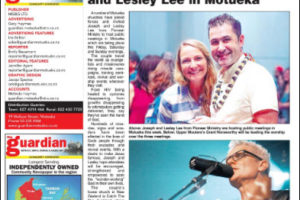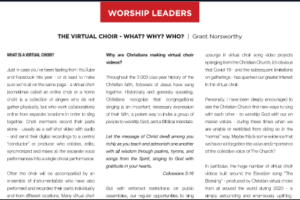Take this link to read Grant’s article as featured in the November issue of Worship…

THE GREATEST QUESTION OF ALL
By Grant Norsworthy
(a continuation of my previous blogpost called “The Greatest Story Of All”)
I have no doubt that the little girl in this photograph loves her daddy. I’m also quite certain that her father still loves her dearly. But this is not the way he wants his daughter to show her love. Am I just like her?
Throughout all of human history, the greatest, most important question has always been the same. God asks, “Will you worship me?” And we are living our answer.
You might know these stories and descriptions already. But have you noticed the common, central theme of worship? Can you hear God’s BIG question? From The Garden of Eden, Cain and Abel, Abraham and Isaac, The Ten Commandments, the Ark and the Tabernacle, the Prophets and Kings of Israel, Shadrach, Meshach and Abednego, Daniel and the lion’s den, The Temple in Jerusalem, throughout the Book of Psalms, The birth of Christ, the temptation of Jesus in the wilderness, the Samaritan woman at the well, the formation of the Church, 2,000 years of Christian history to right now: The GREATEST question from God has always been, and will always be the same: “Will you worship me?”
The Christian Church answer God’s question with an emphatic “Yes Lord, we will worship You!” We build our buildings, form our bands and choirs, craft our “worship songs”, choose a passage of scripture, develop our liturgy and “worship style”, and set aside special times during the week to worship God.
But there’s a frightening and, for the most part, hidden deception at play.
If you listen to the way most Christians use the word “worship”, it shows that we have little understanding of the enormity of the worship story – of God’s all-important question. Even worse, it seems that we have redefined worship on our own terms:
“I loved the worship this morning!”
“I prefer hymns much more than contemporary worship.”
“I slept in and missed worship last week.”
“If you want traditional worship, we provide that at our 8:30am service.”
“I didn’t like the worship at that church. I’m looking for a new church where I like the worship more.”
“Thanks for coming. Please worship with us again next week.”
The contemporary definition of worship – even the Christian worship of God – is far removed from the epic story of worship depicted in The Bible – both Old and New Testaments – and throughout history. Where’s the irresistible, magnetic pull of the greatest story ever told? Where’s the struggle between good and evil? What happened to the great conflict and resolution of worship?
To most Christians, worship is a very particular, small portion of their week – typically an hour or two on a Sunday morning. It involves being inside a certain building and carrying out certain, very specific activities. Many are bored and attend out of a sense of religious duty.
Conflict is hardly involved, if at all. There’s no need for resolution. Just attendance and some level of participation. The greatest struggle of what we refer to as “worship”, it seems, is just to be there on time!
But true worship cannot be limited to just that. Worship is not the Church music program. The worship of God is NOT another spoke in the Christian wheel alongside preaching, teaching, discipleship, the youth program, children’s ministry, missions, evangelism, apologetics or anything else. Worship is the hub of the wheel. Everything that we – The Church – do ought to flow from worship – showing God’s worth.
That’s what worship means – to show the worth of something. Yes, our Sunday gatherings and our songs are important. These are sacred times to corporately and intentionally focus on showing the worth of – or worshiping – God and remind each other of His greatest question and the role we have to play in the greatest of all stories.
But everything we do ought to be an expression of worship to God. That’s 24/7/365 and 366 on a leap year! Every moment of every day provides us with the option to either worship God or the idol of self. The surrender of every selfish instinct, thought and action to God’s supreme Lordship is the worship that He requires. This is the worship that God has prescribes for us as the only way to truly worship – and to truly live.
The worship of God is the only eternal task of The Church. Everything else will cease, but not worship. We’re not there yet. The struggle continues.
We in the Christian Church are NOT answering in the negative to God’s question that summons us to worship Him and nothing more than Him. It’s true that we answer with an insistent “Yes, Lord!”. But we do not fully understand the enormity of what God asks of his worshipers – individually or corporately.
It’s as if we have not heard God’s voice asking the question, but have, instead, created our own question in our own voice: “How do I think I should worship God?”. God’s question and our question are not the same.
Which brings me back to the picture at the top of this blogpost. Perhaps Christians today are like this little girl. Perhaps I am. Yes, we love God, but like a disobedient, self-absorbed child, we want to choose how we worship rather than allowing God to truly transform us into His worshipers. But to “worship” in the ways we would choose is not true worship at all. Instead, it is just another form of disobedient idolatry.
We have created a form of worship that is on our own terms – that fits into our lifestyle, our busy schedule and has no need for conflict nor resolution. No story – just activity. Even as we consider ourselves recipients and bearers of absolute truth, have we been deceived? In the same way that no terrorist would consider themselves a terrorist, no idolater thinks of themselves as being an idolater. They believe, with all their hearts, that they are worshipers.
The great struggle within each of us is between worshiping God – on His terms – and the worship of any other idol. Are we God worshipers on His terms? Or do we worship on our own terms? Are we idol worshipers who think we’re God worshipers? How could we know for certain? Our only hope is found in Christ.
For my part, I must confess: Like the children of Israel, as they are described in the books of old, sometimes I am worshiping God – at least I believe I am – and other times I slip – usually unknowingly – into some form of idolatry or other. And the easiest idol for me to worship is me.
I desire to be nothing but a worshiper and get rid of all my idolatry. I believe that perhaps the most significant step towards this transformation comes as I confess my current and ongoing inclination to idol worship and my absolute hopelessness apart from Christ.


